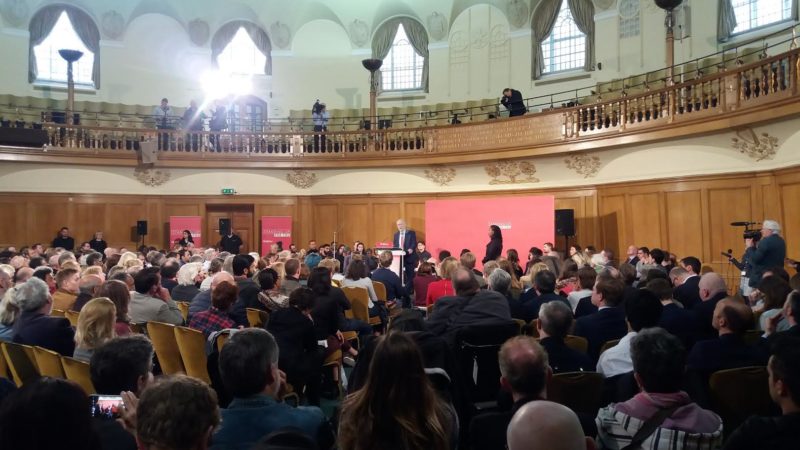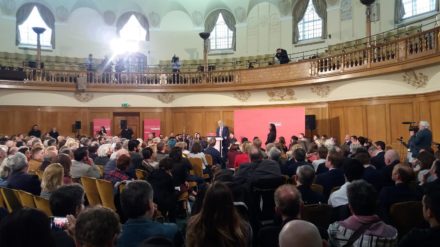

Labour is, like the Light Brigade, charging into the valley of death.
Fans of Lord Tennyson’s poetry will have their own views about who our Raglan, Cardigan and Nolan are in this catalogue of errors.
Our own “jaws of Death” and “mouth of Hell” are polling that shows us on 25 per cent compared to 50 per cent for the Tories, in third place in Scotland and 10 per cent behind in Wales.
Unless something changes very dramatically, Labour faces not a 1983 level defeat (209 seats) but a 1935 one (154 seats) or 1931 one (52 seats). We may find ourselves envying our 1983 predecessors.
Everything that thousands of members have done to build and sustain the Labour Party, from pioneers like my great grandparents who risked their jobs (my great granddad was blacklisted for his union activism) to create the unions and the party from scratch, to the 1945 generation who created the NHS and welfare state, to my generation who got to live in the bliss of three successive landslides, to new members who have known only gritty defensive battles in retreat, is at risk of being washed away.
Like the destruction of the Light Brigade, this was not inevitable.
It is happening because instead of moving towards the voters after our 2015 defeat and addressing their concerns about our leadership and our stances on the economy and immigration, we moved away from them, doubled-down on all the problems and added new, even more deal-breaking concerns around national security.
As Tennyson wrote “Someone had blundered.” We all made choices that got us here.
Ed Miliband did not need to overreact to pressure for party reform after the Falkirk selection fracas by chucking out the electoral college and removing the PLP’s one third say in leadership elections. Nor did he need to introduce a quasi-primary through the registered supporter scheme which gifted the leadership to the candidate best able to recruit beyond existing members. Those of us who opposed these moves but were leadership loyalists could have put up more of a fight.
The MPs who put Jeremy Corbyn on the ballot in 2015 to broaden the debate did not have to do so. I didn’t have to write a column here encouraging them to do so. I foolishly thought letting him run would expose the Hard Left as having marginal support as in Diane Abbott’s bid in 2010. I’ll be apologising for that to the end of my days.
The rival leadership campaigns could have reacted to Corbyn’s mass recruitment by running their own versions. They didn’t manage to respond to the new leadership ballot rules either with suitably inspiring campaigns reaching beyond the existing members, or even by putting in place the processes to recruit people.
Corbyn didn’t need to stay in the race. He didn’t want to be leader, he knew he didn’t have the required skills or experience or persona. There was a real discussion in his team about withdrawing from the contest in the late summer and being king-maker. He could have secured a huge amount in policy and personnel changes without taking on the top job.
In office as Leader, Corbyn could have capitalised on the initial willingness of many of his opponents to serve and try to make things work, and indeed the support of much of the centre of the party for his policy agenda, by building an inclusive coalition. Instead, Momentum was launched and a theme that MPs were traitors and deserved deselection became a self-fulfilling prophesy.
Corbyn could have campaigned harder in the Brexit referendum, secured the extra 2 per cent swing needed, and Britain would have stayed in the EU and there would have been no challenge to his leadership last summer. Once he lost the referendum he could have quit.
Having lost a vote of no-confidence by the PLP, Corbyn could have resigned. Any other leader would have done in those circumstances.
The NEC could have ruled that Corbyn needed to be nominated to re-stand as leader in the same way that Kinnock had to when challenged by Benn in 1988.
The PLP could have handled the confusion around who would run as challenger a lot more neatly, and come up with a stronger challenger.
The candidates who declined to run in 2016 could have done so.
Members did not have to re-elect Corbyn.
He could have quit after the Copeland by-election loss.
He could quit now – the Australian Labor Party leader Bill Hayden quit when a snap election was called in 1983, and Bob Hawke took over and won. A similar swap of Healey for Foot was contemplated at the last minute here in 1983.
All these choices have existed and been made.
We are where we are now.
We have no choice but to embrace the unity of the Last Stand.
We are fighting in this election for the survival of the Labour Party, and with it the hopes of progressive governance in Britain, because that sure as hell isn’t going to come from any other party when the Lib Dems were only two years ago in an austerity coalition with the Tories. We know what long periods of Tory government look like, we have had enough of them. What faces us now is the risk of a perpetually governing Tory party – there are countries with dominant centre-right parties and the Tories would love to join them.
We have to fight for Labour’s survival and to maximise its representation because no other party will fight poverty, fight for a more equal society, deliver properly funded public services. No other party will offer hope to the people in society who most need change.
We have to fight for our MPs because they are the talent pool from which a future Labour Party capable of winning and governing will need to emerge.
Every Labour MP that we can save, every voter that we can get to stick with Labour, makes it one step easier for the party to recover in the years after 8 June, is one less vote or one less seat that has to be recaptured.
Immediately after our 2015 defeat I wrote a piece in which I said: “The road back from this will be longer and steeper now. We may be looking at 10 more years in opposition. We will need to build a coalition broad enough to win even if the Tories bring in boundary changes that set us back even further, and even if Scotland leaves the UK and those 41 previously Labour seats are lost forever.”
The choices we needed to make in 2015 about leadership, policy on the economy and migration, ideology and positioning, all still need to be made but from a lower base.
We did not listen when the voters talked clearly in 2015. Maybe we will listen when they scream in our faces in 2017.
That road back looks even longer and steeper now.




More from LabourList
Sadiq Khan signals he will stand for a fourth term as London Mayor
Starmer or Sarwar: Scottish Labour MSPs and MPs split over Keir Starmer’s future
‘Every Lidl helps: What can the Government do to bring down food prices?’